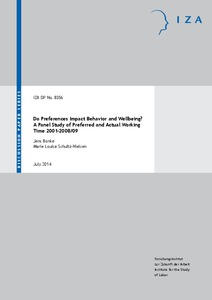Do preferences impact behavior and wellbeing? A panel study of preferred and actual working time 2001-2008/09
"Various European studies show that the majority of those employed wish to work fewer hours than they actually do. The question addressed here is whether imbalanced working hours – working hour tensions – influence changes in behavior: do preferences transmit into reality? Based on a Danish lon...
| Main Authors: | , |
|---|---|
| Institution: | ETUI-European Trade Union Institute |
| Format: | TEXT |
| Language: | English |
| Published: |
Bonn
2014
IZA |
| Subjects: | |
| Online Access: | https://www.labourline.org/KENTIKA-19118102124919363849-Do-preferences-impact-behavior.htm |
| Summary: | "Various European studies show that the majority of those employed wish to work fewer hours than they actually do. The question addressed here is whether imbalanced working hours – working hour tensions – influence changes in behavior: do preferences transmit into reality? Based on a Danish longitudinal time-use study, we find that more Danes prefer shorter working hours over longer working hours, which is in contrast to the Americans. Moreover, not only do the vast majority of overworked Danes adjust their working hours, those who are underworked also do so within a decade. Factors behind these changes are analyzed and means to ensure an optimization of time- and money-related wellbeing are discussed." |
|---|---|
| Physical Description: | 31 p. Digital |

